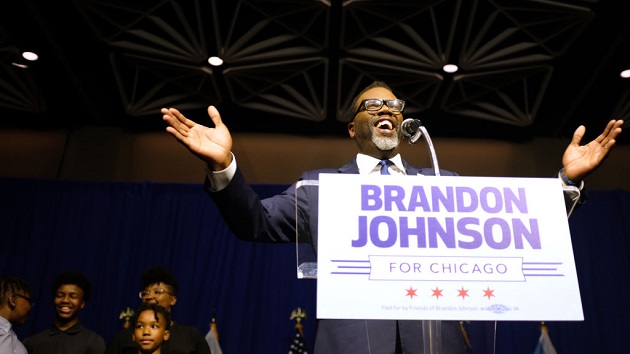(CHICAGO) — Growing up with nine siblings, who all shared one bathroom, Chicago mayor-elect Brandon Johnson said his father taught him: “We are only as strong as the person who was struggling the most.”
Now, after a highly contested runoff election that garnered national attention, Johnson said he is prepared to live by this mantra as he takes office as Chicago’s 57th mayor.
“We have to make sure we reroute the rivers, if you will, particularly in the places where there’s been drought, to make sure that there’s a flow of infrastructure and investments, because that’s going to make us all strong,” he told “Good Morning America” on Wednesday.
Johnson told “GMA3” about his plans for the city, including investing in under resourced communities to address mounting concerns over crime and education.
Chicago had nearly 700 homicides in 2022, which is lower than those in 2021 — the worst year for shooting deaths since the 1990s — but robberies were up nearly 20%.
Since the COVID-19 pandemic, carjackings, looting and muggings in Chicago have become more visible, spreading from concentrated parts of the city to elsewhere, including sleepier neighborhoods that, until recently, were immune from violence, Johnson said.
Johnson said he and his wife are currently raising three children in the Austin community on the west side of Chicago, which he described as “one of the most dynamic neighborhoods” but also one of the most violence ridden.
“It’s one of the highest concentration of Black folks, arguably anywhere in the world,” he said. “And as much as we love it, we’ve had our share of challenges because of disinvestment.”
He plans to respond to the “immediate crisis” of rising crime levels by training and promoting 200 more detectives, implementing the city’s consent decree, and enforcing the red flag laws.
But getting at the “root causes” of crime, Johnson said, requires combatting systemic issues, including by increasing youth employment and improving mental health services.
As a former public school teacher, Johnson said he is also focused on ensuring every child receives a high-quality public education by taking a “comprehensive approach.”
“This very idea of public accommodations comes out of a deep, profound tradition of real liberation,” he said. “There’s a direct correlation between W-2’s in closing the achievement gap between Black and white and brown students.”
“It’s also abysmal, is the fact that we have well over 20,000 students in the city of Chicago who are without homes, and so addressing the housing crisis, making sure that there are real economic opportunities that exist in communities,” he added.
Johnson said it was an “exciting opportunity” to engage young voters in Chicago during the election, who turned out in force to support his candidacy as part of a “multicultural, intergenerational movement.”
“It’s such an incredible moment where the very young people that I taught who are now in their late 20s and early 30s — individuals who probably didn’t like me very much when they were 12 and 13 — I had to go back to them and ask them for their vote,” he said.
“We spoke to not just their hopes and aspirations, we actually gave concrete evidence of the work that we’ve done organizing around economic, racial and social justice and how we can actually translate that into real policy,” he said, mentioning mental health, environmental justice, job opportunities, and transportation as a few priorities.
After the outpouring of support from those young voters, Johnson called it a “great honor” to now have the opportunity to serve the city of Chicago.
“The son of sharecroppers is now prepared to run one of the largest economies in the world. It just shows you how remarkable this country really is,” he said.
Copyright © 2023, ABC Audio. All rights reserved.












